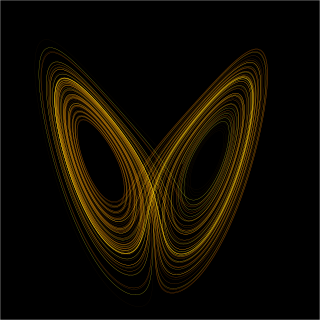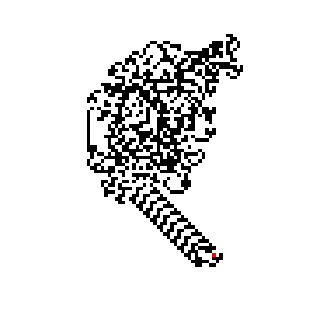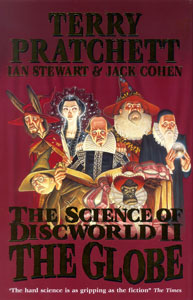
Chaos theory is an interdisciplinary area of scientific study and branch of mathematics. It focuses on underlying patterns and deterministic laws of dynamical systems that are highly sensitive to initial conditions. These were once thought to have completely random states of disorder and irregularities. Chaos theory states that within the apparent randomness of chaotic complex systems, there are underlying patterns, interconnection, constant feedback loops, repetition, self-similarity, fractals and self-organization. The butterfly effect, an underlying principle of chaos, describes how a small change in one state of a deterministic nonlinear system can result in large differences in a later state. A metaphor for this behavior is that a butterfly flapping its wings in Brazil can cause a tornado in Texas.
Irreducible complexity (IC) is the argument that certain biological systems with multiple interacting parts would not function if one of the parts were removed, so supposedly could not have evolved by successive small modifications from earlier less complex systems through natural selection, which would need all intermediate precursor systems to have been fully functional. This negative argument is then complemented by the claim that the only alternative explanation is a "purposeful arrangement of parts" inferring design by an intelligent agent. Irreducible complexity has become central to the creationist concept of intelligent design (ID), but the concept of irreducible complexity has been rejected by the scientific community, which regards intelligent design as pseudoscience. Irreducible complexity and specified complexity, are the two main arguments used by intelligent-design proponents to support their version of the theological argument from design.
In philosophy, Occam's razor is the problem-solving principle that recommends searching for explanations constructed with the smallest possible set of elements. It is also known as the principle of parsimony or the law of parsimony. Attributed to William of Ockham, a 14th-century English philosopher and theologian, it is frequently cited as Entia non sunt multiplicanda praeter necessitatem, which translates as "Entities must not be multiplied beyond necessity", although Occam never used these exact words. Popularly, the principle is sometimes paraphrased as "The simplest explanation is usually the best one."
A complex system is a system composed of many components which may interact with each other. Examples of complex systems are Earth's global climate, organisms, the human brain, infrastructure such as power grid, transportation or communication systems, complex software and electronic systems, social and economic organizations, an ecosystem, a living cell, and, ultimately, for some authors, the entire universe.

The Blind Watchmaker: Why the Evidence of Evolution Reveals a Universe without Design is a 1986 book by Richard Dawkins, in which the author presents an explanation of, and argument for, the theory of evolution by means of natural selection. He also presents arguments to refute certain criticisms made on his first book, The Selfish Gene. An unabridged audiobook edition was released in 2011, narrated by Richard Dawkins and Lalla Ward.

A New Kind of Science is a book by Stephen Wolfram, published by his company Wolfram Research under the imprint Wolfram Media in 2002. It contains an empirical and systematic study of computational systems such as cellular automata. Wolfram calls these systems simple programs and argues that the scientific philosophy and methods appropriate for the study of simple programs are relevant to other fields of science.

Langton's ant is a two-dimensional universal Turing machine with a very simple set of rules but complex emergent behavior. It was invented by Chris Langton in 1986 and runs on a square lattice of black and white cells. The universality of Langton's ant was proven in 2000. The idea has been generalized in several different ways, such as turmites which add more colors and more states.

Ian Nicholas Stewart is a British mathematician and a popular-science and science-fiction writer. He is Emeritus Professor of Mathematics at the University of Warwick, England.
Jack Cohen was a British reproductive biologist also known for his science books and involvement with science fiction.
A lie-to-children is a simplified, and often technically incorrect, explanation of technical or complex subjects employed as a teaching method. Educators who employ lies-to-children do not intend to deceive, but instead seek to 'meet the child/pupil/student where they are', in order to facilitate initial comprehension, which they build upon over time as the learner's intellectual capacity expands. The technique has been incorporated by academics within the fields of biology, evolution, bioinformatics and the social sciences.

The Science of Discworld II: The Globe is a 2002 book written by British novelist Terry Pratchett and science writers Ian Stewart and Jack Cohen. It is a sequel to The Science of Discworld, and is followed by The Science of Discworld III: Darwin's Watch.

The Science of Discworld is a 1999 book by novelist Terry Pratchett and popular science writers Ian Stewart and Jack Cohen. Three sequels, The Science of Discworld II: The Globe, The Science of Discworld III: Darwin's Watch, and The Science of Discworld IV: Judgement Day, have been written by the same authors.

In sociology, social complexity is a conceptual framework used in the analysis of society. In the sciences, contemporary definitions of complexity are found in systems theory, wherein the phenomenon being studied has many parts and many possible arrangements of the parts; simultaneously, what is complex and what is simple are relative and change in time.

The Science of Discworld III: Darwin's Watch (2005) is a book set on the Discworld, by Terry Pratchett, Ian Stewart and Jack Cohen. It is the sequel to The Science of Discworld and The Science of Discworld II: The Globe.
A complex adaptive system is a system that is complex in that it is a dynamic network of interactions, but the behavior of the ensemble may not be predictable according to the behavior of the components. It is adaptive in that the individual and collective behavior mutate and self-organize corresponding to the change-initiating micro-event or collection of events. It is a "complex macroscopic collection" of relatively "similar and partially connected micro-structures" formed in order to adapt to the changing environment and increase their survivability as a macro-structure. The Complex Adaptive Systems approach builds on replicator dynamics.
Extelligence is a term coined by Ian Stewart and Jack Cohen in their 1997 book Figments of Reality. They define it as the cultural capital that is available to us in the form of external media

The Cynefin framework is a conceptual framework used to aid decision-making. Created in 1999 by Dave Snowden when he worked for IBM Global Services, it has been described as a "sense-making device". Cynefin is a Welsh word for 'habitat'.
Complexity theory and organizations, also called complexity strategy or complex adaptive organizations, is the use of the study of complexity systems in the field of strategic management and organizational studies. It draws from research in the natural sciences that examines uncertainty and non-linearity. Complexity theory emphasizes interactions and the accompanying feedback loops that constantly change systems. While it proposes that systems are unpredictable, they are also constrained by order-generating rules.
The Ultimate Boeing 747 gambit is a counter-argument to modern versions of the argument from design for the existence of God. It was introduced by Richard Dawkins in chapter 4 of his 2006 book The God Delusion, "Why there almost certainly is no God".

Does God Play Dice: The New Mathematics of Chaos is a non-fiction book about chaos theory written by British mathematician Ian Stewart. The book was initially published by Blackwell Publishing in 1989.









